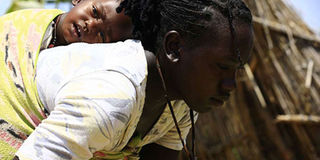Sudan 'impunity' for Darfur crimes must end: rights groups

A Sudanese woman carries her baby as she works outside her house in the village of Shattaya, one of the villages that faced the brunt of militia attacks in the early years of the Darfur conflict. PHOTO | ASHRAF SHAZLY | AFP
What you need to know:
Transitional authorities have not authorised Omar al-Bashir's extradition to face trial at the ICC.
Bashir is subject to arrest warrants by the International Criminal Court for genocide, war crimes, and crimes against humanity in Darfur.
- The rights groups blamed the failure to bring Bashir and other suspects to international justice "on a lack of national and regional political will".
Nairobi,
Human rights groups have called on Sudan's transitional government to end the "reign of impunity" for war crimes committed in Darfur, nearly 17 years after the bloody conflict started.
Sudan's new leaders must "seize this momentum to bring to justice those responsible for the crimes committed in Darfur", the International Federation for Human Rights (FIDH) and other organisations wrote in a report Wednesday.
Following anti-government protests that led to the fall of veteran autocrat Omar al-Bashir in April, an agreement between Sudan's military and protest leaders installed a transitional government tasked with steering the country towards civil rule.
DARFUR CONFLICT
The new government has pledged to end conflicts in regions including Darfur, where war between rebels and pro-government forces caused 300,000 deaths and displaced 2.5 million people since 2003, according to United Nations figures.
Bashir, who was sentenced to two years' detention in Sudan for corruption Saturday, is subject to arrest warrants by the International Criminal Court for genocide, war crimes, and crimes against humanity in Darfur.
BASHIR CRIMES
Transitional authorities have not authorised Bashir's extradition to face trial at the ICC.
The rights groups blamed the failure to bring Bashir and other suspects to international justice "on a lack of national and regional political will".
Authorities in Khartoum must "not obscure past crimes", said Arnold Tsunga, Africa director for the International Commission of Jurists and former FIDH vice president.
The report -- titled "Will there be Justice for Darfur?" -- documented ongoing violence in Sudan, drawing on sources in Darfur and testimony from Darfuri refugees in eastern Chad.
Without accountability and reparation for victims, such crimes will continue, the report's authors wrote, "preventing any real democratic political transition".





